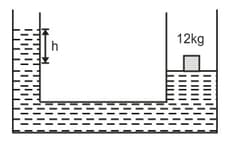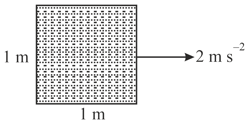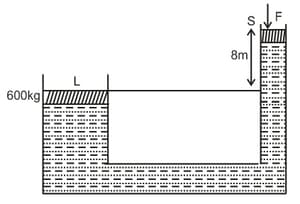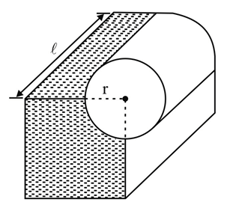Pascal’s Law
Pascal’s Law: Overview
This topic covers concepts, such as, Pascal's Law, Hydraulic Lift, Force on Side Wall of Liquid Vessel & Torque on Side Wall of Liquid Vessel etc.
Important Questions on Pascal’s Law
An open cubical tank was initially fully filled with water. When the tank was accelerated on a horizontal plane along one of its side it was found that one third of volume of water spilled out. The acceleration was
The area of cross-section of the wider tube shown in figure is . If a mass of is placed on the massless piston, the difference in heights h in the level of water in the two tubes is

A bucket contains water filled upto a height= 15 cm. The bucket is tied to a rope which is passed over a frictionless light pulley and the other end of the rope is tied to a weight of mass which is half of that of the (bucket+water). The water pressure above the atmospheric pressure at the bottom is
An open cubical tank completely filled with water is kept on a horizontal surface. Its acceleration is then slowly increased to as shown in the figure. The side of the tank is . Find the mass of water that would spill out of the tank.

A spherical tank of 1.2 m radius is half filled with oil of relative density 0.8. If the tank is given a horizontal acceleration of 10 m/s2. Calculate the maximum pressure on the tank ?
For the system shown in the figure, the cylinder on the left athas a mass of and cross-sectional area of . The piston on the right, at , has cross-sectional area and negligible weight. If the apparatus is filled with oil. Find the force required to hold the system in equilibrium

Find the mechanical advantage of the hydraulic lift.
Mechanical advantage of a hydraulic lift is directly proportional to the:
In a hydraulic lift, to increase the mechanical advantage:
Two syringes of different cross-section (without needle) filled with water are connected with a tightly fitted rubber tube filled with water. Diameters of the smaller piston and larger piston are and respectively. If a force of is applied to the smaller piston then the force exerted on the larger piston is
To what height should a cylindrical vessel be filled with a homogeneous to make the force with which the liquid pressure on the sides of the vessel equal to the force exerted by the liquid on the bottom of the vessel ?
Which of the following work on the Pascal's principle?
An open cylindrical vessel filled with water is rotated together with water at angular speed . At this angular speed, the centre of the bottom is just exposed. If the angular speed is increased to , how much area (in ) of the bottom of the vessel is now exposed to surrounding? [Area of the cross-section of cylinder is ]
Figure shows the cross-sectional view of an arrangement in which a light cylinder of radius and length [perpendicular to the plane of paper] is placed in a container containing liquid of density Assume liquid is incompressible and non-viscous. The net force to be applied on cylinder to keep it in equilibrium is Determine the value of

A soup bowl rests on a table in the dining car of Shatabdi express. If the train is accelerating uniformly at rate of in the forward direction, the angle made by the surface of the soup contained in the bowl with the horizontal is , then value of is :
A hydraulic press can lift when a mass 'm' is placed on the smaller piston. It can lift when the diameter of the larger piston is increased by times and that of the smaller piston is decreased by times keeping the same mass on the smaller piston.
The mechanical advantage of a hydraulic lift is directly proportional to
The mechanical advantage of a hydraulic lift is directly proportional to
